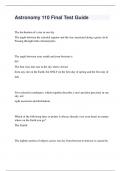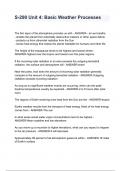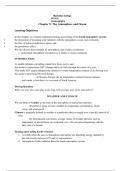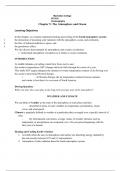Solar noon - Study guides, Class notes & Summaries
Looking for the best study guides, study notes and summaries about Solar noon? On this page you'll find 100 study documents about Solar noon.
Page 2 out of 100 results
Sort by

-
S-290 Unit 4: Basic Weather Processes (2024/2025) Already Passed
- Exam (elaborations) • 6 pages • 2024
- Available in package deal
-
- $8.99
- + learn more
S-290 Unit 4: Basic Weather Processes (2024/2025) Already Passed The thin layer of the atmosphere provides us with - air we breathe - shields the planet from potentially destructive meteors or other space debris - protects us from ultraviolet radiation from the Sun - stores heat energy that makes the planet habitable for humans and other life The height of the tropopause tends to be highest and lowest where highest over the tropics and lowest over the polar regions If the incoming solar radiat...

-
AST 101 EXAM 1 QUESTIONS AND ANSWERS 100% PASS
- Exam (elaborations) • 7 pages • 2023
- Available in package deal
-
- $9.99
- + learn more
AST 101 EXAM 1 QUESTIONS AND ANSWERS 100% PASS the average distance from the earth to the sun is what unit? 1 astronomical unit the distance light travels in a year 1 light year the andromeda galaxy is how many light years away 2,000,000 ly the stars that appear to lie on a dome above us is the ____ _______ the celestial sphere the stars appear to be ____ on the celestial sphere fixed the earth is what in the celestial sphere model? the center of the universe what part of the celestial sph...

-
UST 289 - Midterm 1 Exam Questions With !00% Verified Answers (2023 Update)
- Exam (elaborations) • 14 pages • 2024
- Available in package deal
-
- $11.49
- + learn more
Physical Geography - correct answers study of earths living and nonliving systems/ study of landscapes Geographers' considerations - correct answers Spatial considerations (related to physical space) and Temporal considerations (related to changes of time Atmosphere - correct answers the envelope of gases surrounding the earth or another planet. Biosphere - correct answers part of Earth in which life exists including land, water, and air or atmosphere (all three) Hydrosphere - correct ...

-
Astronomy 110 Final Test Guide
- Exam (elaborations) • 87 pages • 2024
- Available in package deal
-
- $15.99
- + learn more
The declination of a star in our sky The angle between the celestial equator and the star, measured along a great circle Passing through both celestial poles. The angle between your zenith and your horizon is 90°. The Sun rises due east in the sky when viewed from any site on the Earth, but ONLY on the first day of spring and the first day of fall. Two celestial coordinates, which together describe a star's position precisely in our sky, are: right ascension and declination ...

-
S-290 Unit 4: Basic Weather Processes Q&A
- Exam (elaborations) • 4 pages • 2024
-
- $7.99
- + learn more
S-290 Unit 4: Basic Weather Processes The thin layer of the atmosphere provides us with - ANSWER-- air we breathe - shields the planet from potentially destructive meteors or other space debris - protects us from ultraviolet radiation from the Sun - stores heat energy that makes the planet habitable for humans and other life The height of the tropopause tends to be highest and lowest where - ANSWER-highest over the tropics and lowest over the polar regions If the incoming solar radiation ...
PV EXAM PREP (PV 220) PRACTICE EXAM 2024 QUESTIONS WITH 100% CORRECT SOLUTIONS!!

-
Manhattan College SCI 210: Oceanography
- Exam (elaborations) • 13 pages • 2024
-
- $13.37
- + learn more
Manhattan College SCI 210: Oceanography Chapter 5: The Atmosphere and Ocean Learning Objectives In this chapter, we examine radiational heating and cooling of the Earth-atmosphere system: 1. the interaction of incoming solar radiation with the atmosphere, ocean, and continents, 2. the flow of infrared radiation to space, and 3. the greenhouse effect. We also discuss heat transport by atmospheric and oceanic circulations 1. Understand atmospheric circulation as it relates to ocean cir...

-
The Atmosphere and Ocean
- Exam (elaborations) • 13 pages • 2024
-
- $13.29
- + learn more
Manhattan College SCI 210: Oceanography Chapter 5: The Atmosphere and Ocean Learning Objectives In this chapter, we examine radiational heating and cooling of the Earth-atmosphere system: 1. the interaction of incoming solar radiation with the atmosphere, ocean, and continents, 2. the flow of infrared radiation to space, and 3. the greenhouse effect. We also discuss heat transport by atmospheric and oceanic circulations 1. Understand atmospheric circulation as it relates to ocean cir...

-
Course ERAU WX-201
- Exam (elaborations) • 14 pages • 2024
-
- $11.00
- + learn more
WX 201 Test 1 Questions and Answers In the atmosphere Cold air sinks and warm air rises Weather State of the atmosphere with respect to wind, temperature, moisture, pressure, etc. Climate Average or generally prevailing conditions Most abundant gases Nitrogen (78), Oxygen (21), Argon (.93) Which gas has a variable concentration, dependent upon location? Carbon dioxide, methane, ozone, water vapor What are the most common greenhouse gases? CO2, Methane, Ozone ...

-
METEOROLOGY ATSC 110 EXAM | QUESTIONS & ANSWERS (VERIFIED) | LATEST UPDATE | GRADED A+
- Exam (elaborations) • 27 pages • 2024
-
- $13.49
- + learn more
1 METEOROLOGY ATSC 110 EXAM | QUESTIONS & ANSWERS (VERIFIED) | LATEST UPDATE | GRADED A+ What is the primary source of energy for the earth's atmosphere? Correct Answer: the sun List the two most abundant permanent gases in today's atmosphere. Correct Answer: 1.Nitrogen (N2) 78.08% 2.Oxygen (O2) 20.95% When looking at the variable gases in our atmosphere, which one shows the greatest variation at the earth's surface? Correct Answer: Water Vapor varies greatly from place to place...

How did he do that? By selling his study resources on Stuvia. Try it yourself! Discover all about earning on Stuvia



